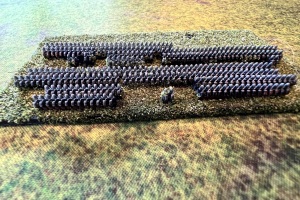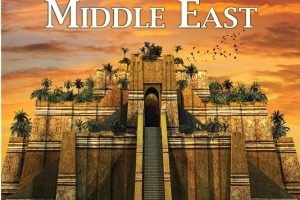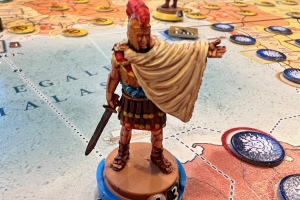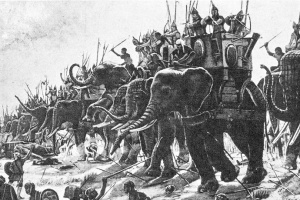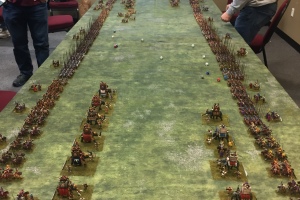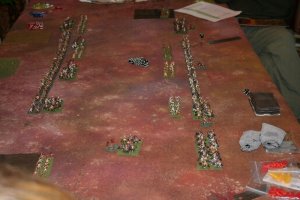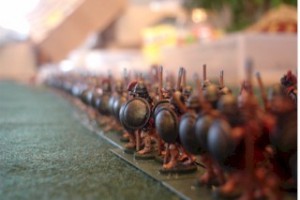Ancients
The game allows you to recreate battles from the start of the Marian reforms in Rome around 105BC, when the professional Roman legionaries organised in cohorts replaced the older Republican Legion structure of maniples, through to about 200AD. Command armies of the Ancient World on a massive scale with these innovative and fun rules that put you in charge for the classic encounters of antiquity. Designed for large battles in smaller scales, Strength & Honour allows you to take to the field at the head of massed ranks of thousands of warriors. With scenarios included for 10 battles you will take the role of leaders such as Julius Caesar, Boudicca and Pompey. In addition to the rules, Strength & Honour includes twenty army lists covering the Ancient world from the island of Britannia in the west to the mystic East beyond the Mediterranean; Germania’s forests in the north and the deserts and mountains of north Africa in the south. Battles focus on large units so for example a legion is the basic unit building block of a Roman army. While the rules were designed for 2mm figures they are playable with any sized figures, or indeed printable top down units which are also available.
14 Photos
If you liked Ancient Civilizations of the Inner Sea, you are going to love Ancient Civilizations of the Middle East! Ancient Civilizations of the Middle East (ACME) is brought to you by the same team that created Ancient Civilizations of the Inner Sea —designers Christopher Vorder Bruegge and Mark McLaughlin with developer Fred Schachter. ACME is not a sequel nor an expansion but a stand alone game using the same multiplayer and solitaire systems as its predecessor with many new and exciting features to intrigue its players. ACME is a game of the chaos-inducing wrath of gods & men—a chaos each player does their utmost to manage, survive, and guide their civilization through to triumphant victory. Spanning the ancient world from the Hellespont to the Indus, from the Caspian to the Red Sea, and from the early Bronze Age to the Hellenic Age, Ancient Civilizations of the Middle East allows you to command not just 10 but 17, SEVENTEEN CIVILIZATIONS! If you want a War Game, you got it. If you want a friendly game, this is it too! As in Ancient Civilizations of the Inner Sea, Ancient Civilizations of the Middle East can be all about war, but it doesn't have to be. It can be a friendly game of exploration, city building, trade, and faith. Players (solitaire, a group of up to six, or even a mix of live players with a system-driven civilization of two or more) can make of ACME what they wish or imagine. Competition can be martial or cultural, warlike or friendly, or a combination of both—how the game unfolds depends entirely on how the players want it to play. The duration of the game is also up to the players: from a multi-hour odyssey of all four Epochs to a pre-arranged shorter contest of an hour or two or to an agreed Sudden Death Victory Point threshold.
2 Photos
Raphia finally hit the table. While I was still 5 units short of my full OOB, the game played very well and balanced. Games were played in both the afternoon and evening sessions on Saturday. The GMT Simple GBoH rules worked perfect, and we were able to play both games to completion (5 players per side) in just over 2 hours despite everyone learning the rules as we went along. The first session ended with a virtual mirror of the historical battle. Each side turned the other’s left flank, and the final result was determined by the heavier Ptolemaic foot on the eastern portion of the field. The second game saw the phalanx’s meet much earlier in the game, and the inability of Antiochus to turn the Egyptian left quickly enough resulted in a Seleucid defeat. A light bit of tweaking of the Egyptian Levy Phalanx ratings will be used in the next game. But overall the game was remarkably balanced from the start. Setup and take down was very quick.
16 Photos


